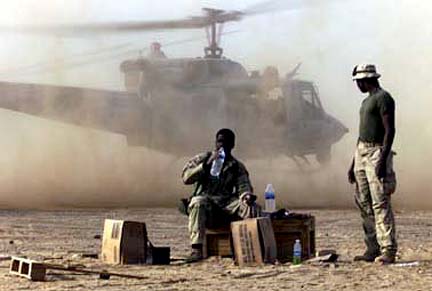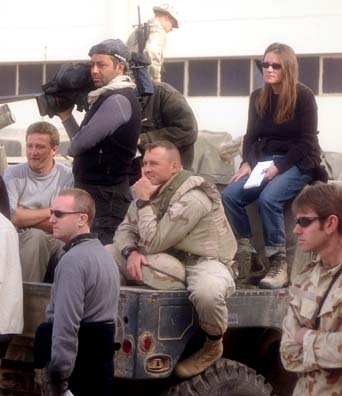


|
The war in Afghanistan was waged under some of the tightest security restraints, making it difficult for reporters who were covering the story and military leaders who wanted only limited information released.
Accommodating the media
on the battlefield is a tough
balancing actBy Gregg K. Kakesako
gkakesako@starbulletin.comCmdr. Roxie Merritt, a Navy spokeswoman who worked out of Bahrain, said these were the "tightest security rules" she has seen in her two decades of service. "It was the biggest challenge in my Navy career."
Marine Maj. Chris Hughes, who spent nearly three months in Afghanistan beginning in November, considered it "a major challenge to get the story out of the young Marine who put his life on the line."
Hughes was sent from Marine Corps Base Hawaii at Kaneohe Bay, where he had been its chief spokesman since May, first to Bahrain, then to a forward operating base in southern Afghanistan known as Camp Rhino, and finally to Kandahar airport.

|
Camp Rhino, located 70 miles south of Kandahar, was established on Nov. 25 by the Marines as their initial forward operating base in southern Afghanistan. The force of roughly 1,500 Marines included members of the 15th Marine Expeditionary Unit of Camp Pendleton from California, and the 26th Marine Expeditionary Unit of Camp Lejeune from North Carolina.After spending roughly a month at the camp, the Marines shifted their operations to the Kandahar International Airport. In the words of the Marines, Camp Rhino was "returned to the desert."
Although the Afghanistan war involved elements of all the services and many of America's allies, there may be an erroneous perception that many of the battles were won by the Marines.
That's not the case, Hughes added, but the Air Force and the Army's Special Operations branch "just didn't tell their story."
Hughes told members of the Public Relations Society of America last week, "It may look like we won the war, but that is only because we just opened up."
For the better part of eight weeks, Hughes said, "the Marines had the lead story."
While at Kandahar, Hughes said, he was able to provide daily Marine-related stories for CNN for a month.
However, Hughes said that "victory" was obtained over some painful lessons in dealing with the media.
One of the biggest problems that was never overcome was the inability of the military to provide transportation to get the media into the combat zone. "We could not get the lift we needed to get the media into the theater of operations." Hughes said.
That led to stories that compared the U.S. military's operations to those of the Soviets, saying it was easier to get information out of that communist country.
Then there was the incident when Marine Corps Brig. Gen. James Mattis got criticized for responding to a reporter who, after the Marines had successfully seized a remote airstrip southwest of Kandahar on Nov. 26, asked whether "we own a piece of Afghanistan," and the general concurred.
As commander of the Marine attack Task Force-58, which made an amphibious assault 400 miles inland, Mattis said: "The Marines have landed, and we now own a piece of Afghanistan. Everything went without a hitch." However, within hours, Secretary of Defense Donald Rumsfeld issued a sharp rebuke, saying: "They are not an occupying force. Their purpose is to establish a forward base of operations to help pressure the Taliban forces in Afghanistan, to prevent Taliban and al-Qaida forces from moving freely about the country."
Hughes said Mattis, who was responding to the effects of the Sept. 11 terrorist attacks, wasn't ready for such media scrutiny and at the time had no public affairs specialist as part of his team to advise him. He added that despite this minor setback, Mattis continued supporting the needs of media, "allowing them to sit in on command briefings -- something that is usually not done."
Hughes cited another incident at Camp Rhino in December where three Marines had to be evacuated with injuries from land mines In Kandahar. "Reporters knew something was up since they saw the ambulances," Hughes said.
The three had been walking toward a house near Kandahar airport through a field they thought had been cleared of explosives, when one of the Marines set off a mine. The Marine casualties in Kandahar were the first since the military occupied the airport.
Hughes thought his problems were solved after he got clearance to allow reporters and photographers from the New York Times, London Sun Press, Reuters and the San Diego Union Tribune to set up some distance away to observe the injured being loaded onto a cargo plane.
A battalion commander at that pointed decided that he didn't want the media to see what was happening and ordered his Marines to line up so they would block the media's view. That resulted in a shouting match between the two sides.
"At that point the story changed from Marines fighting for their country who get injured," Hughes said, "to Marines obscuring media coverage."
He said this battalion commander hadn't learned what has been taught to all military commanders: that "the media will be on the next battlefield."
Hughes said that military leaders get good training on how to anticipate problems of war. "This commander probably rehearsed every combat scenario," Hughes added, "but he never thought, 'What am I going to do in a situation like this where there are reporters and cameras on the battlefield?'"
"You have to plan for it," Hughes added. "It's going to happen."
The lack of transportation necessitated the use of media pools, which is never easy because of limits on the number of reporters and cameramen, Hughes said. Before the actual shooting started, Hughes said, he was able, with the help of Cmdr. Jeff Alderson, who once served as Pacific Fleet spokesman here and is now with the Navy's 5th Fleet, "to get everyone out to ships, but that got old really fast."
Eventually, the Marines were able to place five journalists with members of the 15th Marine Expeditionary Force stationed on the USS Peleliu, and they accompanied them into Afghanistan.
By the time the Marines had occupied Camp Rhino, there were about 15 members of the media with them, and Hughes said his job was then to try to rotate them with other reporters.
But it was always a case of competing with "the beans, bullets and Band-Aids" on whatever military transportation was available. There also was a continuing battle with some military commanders who questioned the need to accommodate newsmen, Hughes said.
"It was like being the center of a tornado," Hughes said. "If it doesn't kill you, it's a real rush."